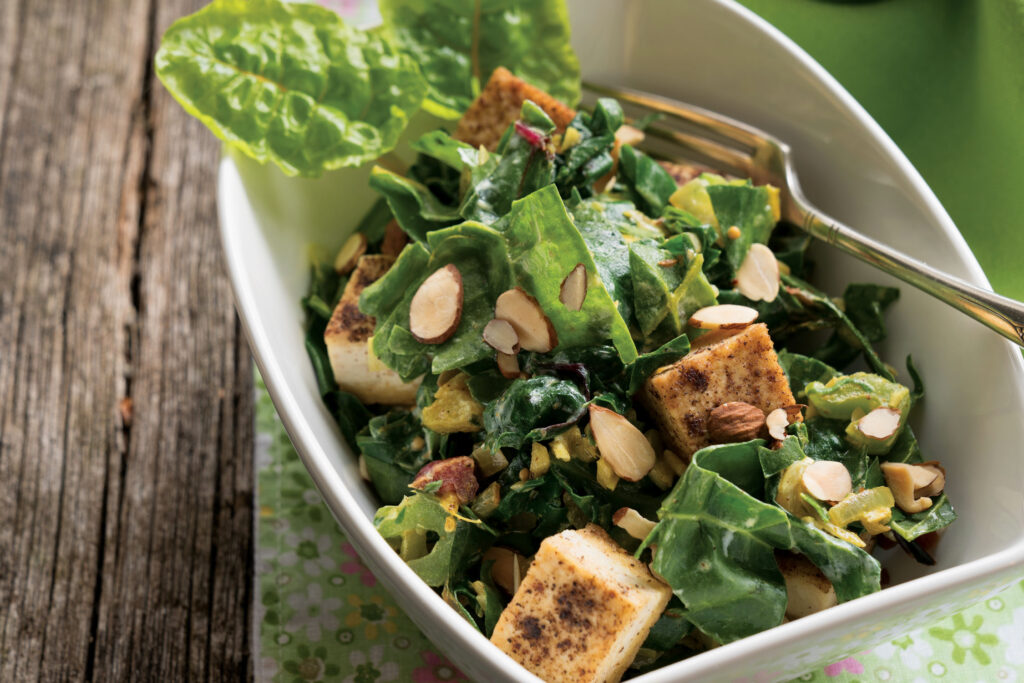Advertisement
The Green Party
New ways with leafy greens

Green has long been the colour of health. And when it comes to a feel-good factor, there are few foods that rival leafy greens. Packed with a slew of vitamins, minerals, and tongue-twisting antioxidants, items such as kale and spinach are the cancer-fighting, age-avengers of the produce department. That’s why we all should work them into our diets any chance we get.
While salads are a no-brainer when it comes to munching on greens, there’s no reason you should stop there. Leafy greens are surprisingly versatile in the kitchen, making it that much easier to eat a bounty of them as a step toward glorious good health. Start with these unconventional ways to use everything from collards to arugula that’ll make other veggies green with envy.
Advertisement
Green recipes
Tofu Chard Saag
Collard Chicken Wraps with Green Hummus
Chickpea Spinach Waffles
Cream of Kale Soup
Grilled Greek Romaine Steak
Hit the green
Deserving of their superfood epithet, leafy greens have cancer-protective nutritional might. And they’re also helpful in the battle against several other health woes. A study in the journal Neurology found that a group of participants who ate the most servings of leafy greens per day (an average of 1.3 servings daily) had lower rates of cognitive decline than those who ate fewer leafy greens.
What’s more, upping your daily intake of leafy green vegetables by 1 1/2 servings may lower your risk of type 2 diabetes by 14 percent, notes a study review in the British Medical Journal. Here are the greens that should find a home in your shopping cart, with ways to use them that aren’t all salads.
| Green | Nutritional firepower | Outside the salad bowl |
| arugula | Source of the bone-builders calcium and vitamin K. Higher intakes of cruciferous veggies such as arugula may lessen the risk of lung cancer in nonsmokers, as well as prostate cancer. | Stir into pasta dishes; blend into vinaigrettes; use as a peppery topping for burgers, pizza, or grilled cheese. |
| collards | A payload of vitamin K, vitamin C, beta carotene, and dietary fibre. Higher fibre diets appear to help fend off various cancers such as renal and breast. | Use in place of bread for sandwich wraps; fold into stews; make as the base for egg shakshuka. |
| parsley | A stealth source of folate and vitamins A, C, and K to help keep cancer at bay. | Blend into sauces, dressings, and pestos; sprinkle over cooked shellfish such as mussels; stir into cooked grains such as quinoa. |
| kale | Brimming with lutein, an antioxidant that may help in the fight against certain cancers, such as breast cancer. | Use in frittatas, pestos, and soups. |
| romaine | A great source of beta carotene, an antioxidant associated with a lower | Grill and top with your favourite dressing; add to grain bowls; use as you would taco shells. |
| spinach | risk of bladder cancer in women. | Blend into smoothies, dips, and even pancake batter. |
| Swiss chard | A mere 1 cup (250 mL) serving delivers three times the daily need for vitamin K, a nutrient linked with lower risks of mortality from diseases such as cancer and heart disease. | Wilt and use on bruschetta; use in stir-fries; incorporate into veggie burgers; and add to scrambled eggs. |










